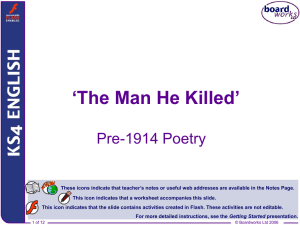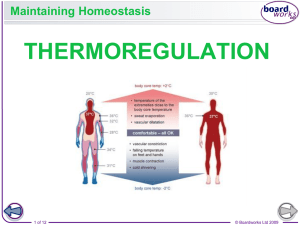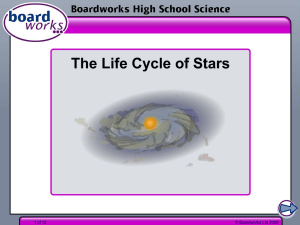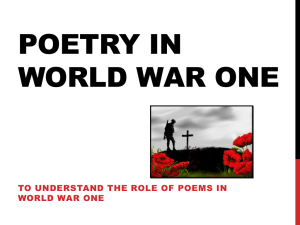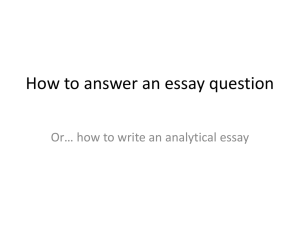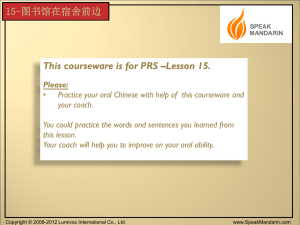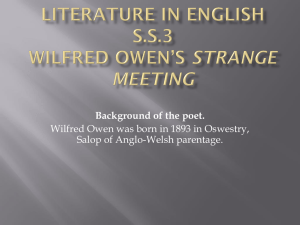War Poetry
advertisement
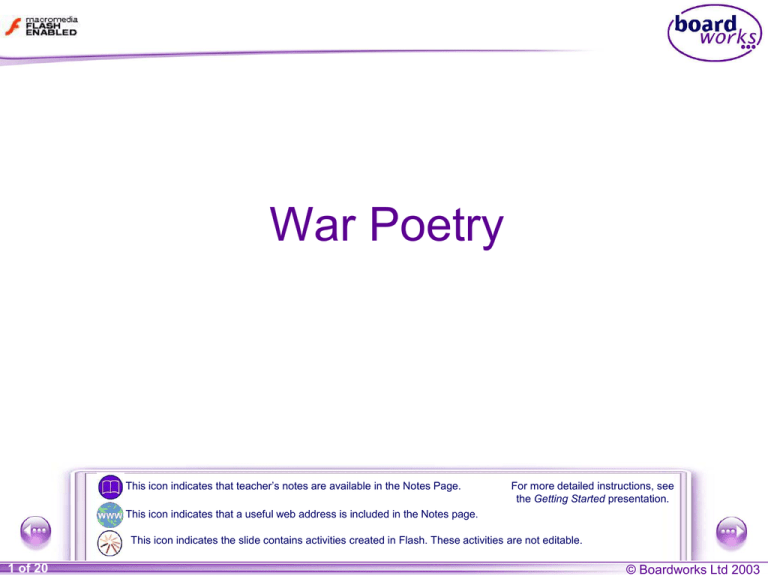
War Poetry This icon indicates that teacher’s notes are available in the Notes Page. For more detailed instructions, see the Getting Started presentation. This icon indicates that a useful web address is included in the Notes page. This icon indicates the slide contains activities created in Flash. These activities are not editable. 1 of 20 © Boardworks Ltd 2003 War poetry 2 of 20 © Boardworks Ltd 2003 World War One When war broke out in Britain in 1914, the country had no compulsory military service and therefore no huge conscript army like other European countries. Britain was to rely on a small professional force. A campaign began to sign up volunteers with slogans like: 3 of 20 © Boardworks Ltd 2003 Recruiting poems Recruiting poems were written and published in papers to encourage young men to go to war: What will you lack, sonny, what will you lack When the girls line up the street, Shouting their love to the lads come back From foe they rushed to beat? Will you send a strangled cheer to the sky And grin till your cheeks are red? But what will you lack when your mate goes by With a girl who cuts you dead? from ‘Fall In’ by Harold Begbie, 1914 1. What is the poet’s view of war? 2. How does he encourage young men to sign up? 4 of 20 © Boardworks Ltd 2003 Recruiting poems Here are another four lines from the same poem. What poetic techniques has the poet used here and why? Repetition to emphasize the point and leave the words ringing in the ear. Where will you look sonny, where will you look When your children yet to be Clamour to learn of the part you took In the war that kept men free? Emotive language used to provoke a particular reaction (guilt) in the reader. 5 of 20 Rhyme used to give the poem a less serious and more melodious, memorable tone. © Boardworks Ltd 2003 Recruiting poems What other words of persuasion could Begbie use to convince young men to sign up? Write your own stanza to add to his poem. How might a young man who is unwilling to go to war respond to Begbie’s argument? This famous poster was designed by Savile Lumley during the World War I. 6 of 20 © Boardworks Ltd 2003 Rupert Brooke – ‘Peace’ After recruiting poems, the trend was to write poems which glorified the British cause in war. Rupert Brooke wrote sonnets to express the chivalry of war: Now, God be thanked Who has matched us with his hour, And caught our youth, and wakened us from sleeping, With hand made sure, clear eye, and sharpened power, To turn, as swimmers into cleanness leaping, Glad from a world grown old and cold and weary, Leave the sick hearts that honour could not move, And half-men, and their dirty songs and dreary, And all the little emptiness of love! How can you tell that Brooke had not yet been to war? 7 of 20 © Boardworks Ltd 2003 Rupert Brooke – ‘The Soldier’ If I should die, think only this of me: That there’s some corner of a foreign field That is for ever England. There shall be In that rich earth a richer dust concealed; A dust whom England bore, shaped, made aware, Gave, once, her flowers to love, her ways to roam, A body of England’s breathing English air, Washed by the rivers, blessed by suns of home. And think, this heart, all evil shed away, A pulse in the eternal mind, no less Gives somewhere back the thoughts by England given; Her sights and sounds; dreams happy as her day; And laughter, learnt of friends; and gentleness, In hearts at peace, under an English heaven. 8 of 20 © Boardworks Ltd 2003 Rupert Brooke Brooke deeply believes that he is on the side of the righteous because that is what he has been told. A German writer, Remarque, wrote a novel called All Quiet on the Western Front, based on the German experience of World War I. Here is an extract: "I am young, I am twenty years old; yet I know nothing of life but despair, death, fear, and fatuous superficiality cast over an abyss of sorrow. I see how peoples are set against one another, and in silence, unknowingly, foolishly, obediently, innocently slay one another." Chapter 10. 9 of 20 © Boardworks Ltd 2003 Rupert Brooke Do you think the Germans believed they were on the ‘wrong side’ as Brooke suggests they are? Do you agree with Brooke’s view of war? Why do you think he wrote such poems before he had even been to the front lines to fight? The remains of a German soldier, November 1916 10 of 20 © Boardworks Ltd 2003 Owen and Sassoon Although recruiting poems and poems reflecting the chivalry of war were very popular at the time, the poems from World War I which have had a lasting power over us are those poems which express the horrors and realities of war. Wilfred Owen and Siegfried Sassoon are the most well known of such poets. 11 of 20 © Boardworks Ltd 2003 Wilfred Owen (1893–1918) This is an extract from a poem by Owen called ‘Disabled’. He sat in a wheeled chair, waiting for dark, And shivered in his ghastly suit of grey, Legless, sewn short at elbow. Through the park Voices of boys rang saddening like a hymn, Voices of play and pleasure after day, Till gathering sleep had mothered them from him. 1. What feelings do you think the man is suffering from in this poem? 2. How is the reality of war in this poem different to Brooke’s imagined glory? 12 of 20 © Boardworks Ltd 2003 Wilfred Owen (1893–1918) This is the last stanza from a poem by Owen called ‘Exposure’. Tonight, this frost will fasten on this mud and us, Shrivelling many hands, puckering foreheads crisp. The burying-party, picks and shovels in shaking grasp, Pause over half-known faces. All their eyes are ice, But nothing happens. 1. How is the form of this poem different to Brooke’s and Begbie’s pro-war poems? 2. If you were to paint an interpretation of this stanza, how would you do it? 13 of 20 © Boardworks Ltd 2003 Wilfred Owen – ‘Anthem for Doomed Youth’ What passing-bells for these who die as cattle? Only the monstrous anger of the guns. Only the stuttering rifles’ rapid rattle Can patter out their hasty orisons. No mockeries for them; no prayers nor bells, Nor any voice of mourning save the choirs, – The shrill, demented choirs of wailing shells; And bugles calling for them from sad shires. What candles may be held to speed them all? Not in the hands of boys, but in their eyes Shall shine the holy glimmers of goodbyes. The pallor of girls’ brows shall be their pall; Their flowers the tenderness of patient minds, And each slow dusk a drawing-down of blinds. 14 of 20 © Boardworks Ltd 2003 Siegfried Sassoon (1886–1967) Siegfried Sassoon was appalled by the pointlessness of war and began a crusade against it through letters and poems. He became a friend of Wilfred Owen when the two men met at a hospital for victims of shellshock. Does it matter? – losing your legs?... For people will always be kind, And you need not show that you mind When others come in after hunting To gobble their muffins and eggs. Can you find any similarities between this poem and Owen’s poetry? 15 of 20 © Boardworks Ltd 2003 Siegfried Sassoon (1886–1967) This is a poem by Sassoon called ‘Base Details’. If I were fierce, and bald, and short of breath, I’d live with scarlet Majors at the Base, And Speed glum heroes up the line to death. You’d see me with my puffy petulant face, Guzzling and gulping in the best hotel, Reading the Roll of Honour. ‘Poor young chap,’ I’d say – ‘I used to know his father well; Yes, we’ve lost heavily in this last scrap.’ And when the war is done and youth stone dead, I’d toddle safely home and die – in bed. Copyright Siegfried Sassoon by kind permission of George Sassoon. 1. Who is Sassoon criticizing here and why is he doing it? 2. What words do you find particularly effective? 16 of 20 © Boardworks Ltd 2003 World War I Poetry 17 of 20 © Boardworks Ltd 2003 World War I Poetry Write your own anti-war poem using the picture below as a stimulus: Mourning a fallen comrade, August 1917 18 of 20 © Boardworks Ltd 2003 World War I leaflet Do you agree or disagree with war? How have the poems you have read affected your decision? Imagine you were living at the time of World War I. Write a leaflet which is either anti-war or prowar which is to be handed out to prospective volunteers. British raiding party under fire 19 of 20 © Boardworks Ltd 2003 Essay preparation Compare and contrast the views, ideals and language of the anti-war and pro-war poets. ANTI-WAR 20 of 20 PRO-WAR © Boardworks Ltd 2003

![Direction_and_Scale[1]](http://s2.studylib.net/store/data/005432475_1-80ce3065f13008250a8cdec135db9846-300x300.png)
